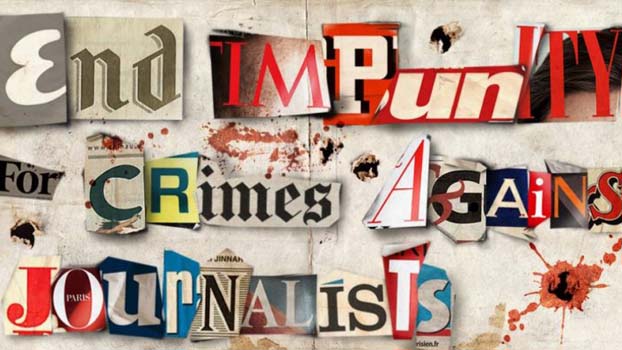International Day to End Impunity for Crimes against Journalists
Protect Newsmen, let them safeguard the truth

In its latest study titled ‘Getting Away with Murder’ published on Tuesday, Committee to Protect Journalists (CPJ) states that impunity for the murder of journalists is still overwhelmingly the norm in more than a dozen countries, including Bangladesh. The study placed Bangladesh, with 10 unsolved murders at 10th spot on a list of 13 worst offenders.
From news rooms to parliament we often hear that ‘journalists are the mirror of the society’. But their journey to becoming a mirror to reflect the ugly events of our society is thorny indeed. In order to serve the people journalists have to dig up the truth or story behind the story that people in authority do not want to reveal. Journalists are those who keep the truth alive even in the face of danger. But in order to expose the truth and sift fact from the fiction, they ace many difficulties in the form of threats and manipulation by various unscrupulous wing of power.
However before delving into the instances of violence against journalist around the world it must be mentioned that the number of countries regarded as safe countries where journalists can work in a proper condition, in complete security, is declining month after month, year after year. According to the world press freedom index 2019, “hatred of journalists has degenerated into violence contributing to an increase in fear”. We have seen that authoritarian regimes are tightening their grip on the media everywhere. However, Reporters Without Borders (RWB) has rightly termed it as an extremely worrying phenomenon for journalism around the world. It is saddening that information is a right only in theory, but in practice, it is not anymore. RWB states that the people who want to kill or silence journalists are increasingly empowered by political leaders especially in democratic countries. And the truthfulness and authenticity of the statement made by the Reporters Without Borders lies on the incidents that took place in recent time across the world famous democracies.
In the past twelve years more than 1,000 journalists have been killed for reporting the news and bringing information to the public. In nine out of ten cases the killers go unpunished. Impunity leads to more killings and is often a symptom of worsening conflict and the breakdown of law and judicial systems.
According to the Committee to Protect Journalists’ Global Impunity Index, impunity in the cases of murdered journalists remains firmly entrenched in over a dozen countries, including those mired in conflict and democracies alike. The report spotlights countries where journalists are murdered regularly and their killers go free.
In the past decade, armed militant groups have most often targeted journalists with complete impunity, including in Somalia, which tops the list for the fifth year in a row. However, criminal groups have become a major threat. Mexico, to date this year’s deadliest country for journalists, has seen its impunity rating worsen nearly every year since 2008, as criminal cartels wage a campaign of terror against the media. During the 10-year index period ending August 31, 2019, 318 journalists were murdered in retaliation for their work worldwide, and in 86% of those cases no perpetrators have been successfully prosecuted.
What ties hundreds of thousands of such cases around the world like and like them in the last year alone, is that most of them took place in democratic countries and are linked by implication or by direct association to political leaders and parties. Physical violence against journalists, and against any citizens who use journalistic techniques to document and investigate abuses around them, has become a direct consequence of the new, angry populist politics that targets “elites” and “the mainstream media” as enemies of the people.
A safe and enabling environment for journalists
should be created to allow them to work
independently and without unjustified interference.
Authoritarian leaders and others do not only turn upon critical media from vanity. It is also because they know that to silence journalists is to silence the voices of all those who speak through the media, or who might be tempted to speak in future. Courageous journalists are often among the few forces defending democracy or at least offering some check on power: the people to whom citizens turn when police and courts and political institutions fail them; the people who can inform citizens of what is really happening.
The situation of violence against journalist is not so much different in Bangladesh from around the world. The safety and security for journalists in the country are on the wane. According to recent report of this daily, a total of 14 professional journalists have so far been killed in the last 18 years only in the south-eastern part of the country. What is more disgracing is that none of the killers have been managed to award punishments as yet.
Reportedly, Bangladesh has catalogued cases involving abuses and episodes of violence against journalists in the recent decades. In most of the cases, the reporters who were killed and murdered haven’t been found, that is to say a culture of impunity seems to have prevailed. We may not have a high number of killings of journalists, but in terms of threat and physical assault, no doubt we remain in a state of concern. As no significant progress has been observed in any of these cases, the prevailing situation gives the perpetrators a green signal to carry on the crime.
Over the last years, the ground and impact of journalism, with the innovation and intervention of technology, has expanded at a rapid pace. Consequently manipulation over the journalists is pushing them towards suppression, sometimes ideologically, sometimes morally. And those newsmen who try to be vocal about the truth are often seen being harassed, murdered and slaughtered. Thus journalism is increasingly becoming a risky profession and eventually journalists tend to refrain from reporting on sensitive issues.
In the past year there has been a troubling spike in the number of journalists murdered for their work. The cases above are only a fraction of the men and women who have been slain in the line of duty. Each is a heartbreaking loss, and represents countless stories that will go untold. Murder is the ultimate form of censorship, yet the perpetrators are seldom held to account. In nine out of 10 cases where a journalist has been targeted for murder, their killers go free. The price of a story should never be that high.
We condemn all attacks and violence against journalists and media workers. We urge the government to prevent violence against them, ensure accountability, bring to justice the perpetrators and ensure victims have access to appropriate remedies. A safe and enabling environment for journalists should be created to allow them to work independently and without unjustified interference.
Sayeed Hossain Shuvro is Editorial Assistant, Bangladesh Post




